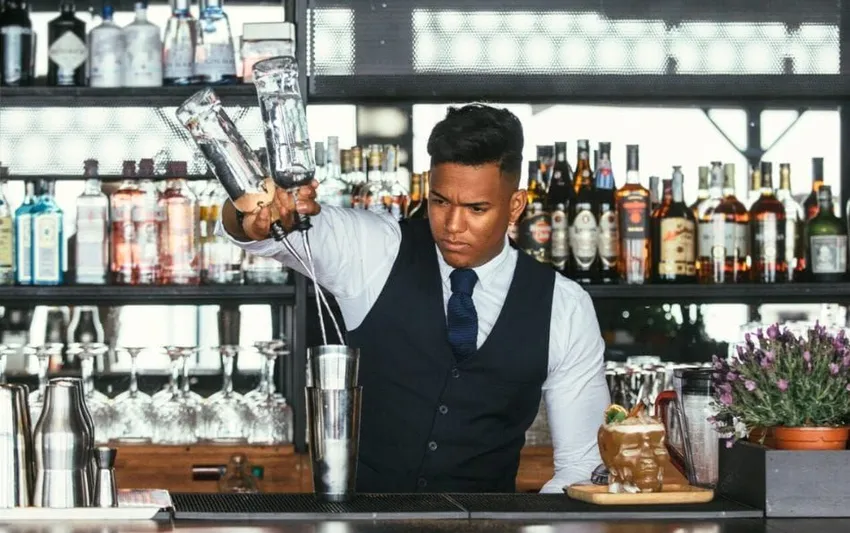To better understand the Hotel vs. Restaurant Bartender distinction, you first need to learn more about both roles, including their responsibilities and key skills required for each of them. That's exactly what we're going to cover in this article.
Definitions and Key Differences of a Hotel Bartender vs. a Restaurant Bartender
The main differences between Hotel Bartenders and Restaurant Bartenders are the clientele they serve and the environment they work in. While the former serve customers who are there for a short time, the latter often serve regular customers.
What Is a Hotel Bartender?
A Hotel Bartender works in the property's bar or lounge. They typically serve tourists, business travelers and participants in events hosted at the hotel. Hotel Bartenders are a part of a larger hospitality team and they work together with other staff members to ensure guests have an enjoyable time at the hotel.
Since they serve clientele from all across the world, they often cater to a variety of tastes and preferences. However, their job is also to offer local specialty drinks to create a more unique experience for guests.
What Is a Restaurant Bartender?
A Restaurant Bartender works in dining establishments and their primary focus is on serving drinks to complement the meals being served. They take orders that Servers relay to them or directly from guests who are seated at the bar.
Restaurant Bartenders enhance the food offerings at the establishment by serving drinks that complement it. It's important that they're familiar with the restaurant's menu items and capable of recommending beverages that go well with these. A restaurant's bar is sometimes used as a waiting area where customers can sit while waiting for their table. In such cases, the Bartender's job is to ensure they have a pleasant time until their reservation is ready.
Clientele and Interaction Styles
The type of clientele and the nature of interactions can vary between Hotel and Restaurant Bartenders:
- Hotel Bartenders: Typically serve a transient clientele, including tourists and business travelers. This requires adaptability and the ability to engage with guests from diverse cultural backgrounds. Hotel Bartenders often provide guests with information about local attractions and services, enhancing the overall guest experience.
- Restaurant Bartenders: Often build relationships with regular patrons, fostering a sense of community. They may engage in more personalized interactions, remembering guests' preferences and creating a welcoming atmosphere that encourages repeat business.
Dress Code and Professional Expectations
Attire and professional expectations can differ significantly between hotel and restaurant Bartenders:
- Hotel Bartenders: Often adhere to a formal or smart-casual dress code, reflecting the hotel's overall ambiance. Uniforms are typically provided to maintain a cohesive and professional appearance. Additionally, Hotel Bartenders are expected to have a broad knowledge of international beverages and cocktails to cater to a diverse clientele.
- Restaurant Bartenders: Dress codes can vary widely depending on the establishment's theme and clientele. Some restaurants may require formal attire, while others adopt a more relaxed dress code. The focus is often on complementing the restaurant's dining experience, which may include crafting specialty cocktails that pair well with the menu.
Roles and Responsibilities of a Hotel vs. Restaurant Bartender
Hotel and Restaurant Bartenders share some primary responsibilities such as mixing drinks and interacting with guests. However, their roles diverge when it comes to daily routines and execution of responsibilities.
Key Responsibilities of a Hotel Bartender
A Hotel Bartender doesn't only mix drinks behind the bar but also plays a large role in creating a memorable and pleasant stay for guests. Therefore, some of their key responsibilities include:
- Guest interaction: A Hotel Bartender offers personalized service and attends to guests' needs. They can also give guests recommendations for places to see and things to do around the area.
- Service coordination: A Hotel Bartender works closely with non-restaurant staff members, such as a Concierge or a Hotel Manager, to enhance the guest experience.
- Event participation: Besides the property's dining or drinking establishment, a Hotel Bartender also provides service during events and banquets hosted at the hotel.
- Bar menu creation: A Hotel Bartender curates the menu to include cocktails that align with the hotel's branding.
- Ambiance maintenance: A Hotel Bartender ensures that the bar area is welcoming and reflective of the hotel's overall ambiance.
Key Responsibilities of a Restaurant Bartender
A Restaurant Bartender mixes drinks and enhances the overall dining experience. They often interact with regular customers and have to align their service with the restaurant's menu. Some of their key responsibilities are:
- Customer engagement: A Restaurant Bartender serves and often engages in conversations with customers seated at the bar.
- Service efficiency: Since they serve both bar and table orders, a Restaurant Bartender coordinates their service with Servers and ensures all drinks arrive in a timely fashion.
- Menu knowledge: A Restaurant Bartender studies the restaurant's menu and suggests drinks to create good pairings.
- Thematic consistency: A Restaurant Bartender prepares a variety of drinks that align with the restaurant's overall theme.
- Special events coordination: Restaurants may also host special events, so it's up to the Restaurant Bartender to think of cocktails and other beverages that can be served on such occasions.
In addition to mixing drinks and managing bar inventory, Bartenders in both settings must tailor their service to align with the establishment's environment and clientele. This includes understanding the unique demands of their workplace, whether it's the formal setting of a hotel bar or the dynamic atmosphere of a restaurant.
Key Skills Required for Each Role
Just like with responsibilities, there are some specific skill requirements that are associated with each of these two roles. These essential skills are tailored to the Bartenders' specific environments and clienteles.
Skills a Hotel Bartender Should Have
Some of the unique skills Hotel Bartenders should have are:
- Versatility: A Hotel Bartender has to be able to adapt to a variety of guests and tailor their services accordingly.
- Professionalism: A Hotel Bartender needs to maintain a high standard of conduct to ensure the service is in line with the hotel's image.
- Language proficiency: Proficiency in multiple languages can be a huge plus for a Hotel Bartender.
- Upselling techniques: A Hotel Bartender may often recommend and promote other services the hotel offers.
- Serving for special events: A Hotel Bartender may have to provide service for large events held in the hotel and align it to the event's specific needs.
Skills a Restaurant Bartender Should Have
The specific skills required for Restaurant Bartenders include:
- Speed and efficiency: Since they serve both customers at tables and at the bar, a Restaurant Bartender needs to be fast and efficient in making drinks.
- Customer service: A Restaurant Bartender has to offer exceptional customer service, often building lasting relationships with regular customers.
- Culinary knowledge: A Restaurant Bartender needs to have basic understanding of food being served at the establishment and be able to create good food and drink pairings.
- Creativity: While they usually serve classic beverages, Restaurant Bartenders may have to get creative and come up with special recipes for specific events. However, when a restaurant wants to create and offer unique drinks, they may simply hire a Mixologist.
- Team coordination: A Restaurant Bartender often works closely with Servers and some of the kitchen staff members to ensure pleasant service.
Hotel vs. Restaurant Bartender: Conclusion
As you can see, the Hotel vs. Restaurant Bartender distinction is easy to grasp. A Hotel Bartender often interacts with travelers and is in charge of creating a welcoming atmosphere for them. A Restaurant Bartender, on the other hand, focuses on complementing the dining experience and offering personalized experience to regulars.
Understanding the key differences between these two roles is important, especially if you're considering a career as a Bartender. Learning more about their key skills and responsibilities should also help you decide which role suits you better.










Loading comments...